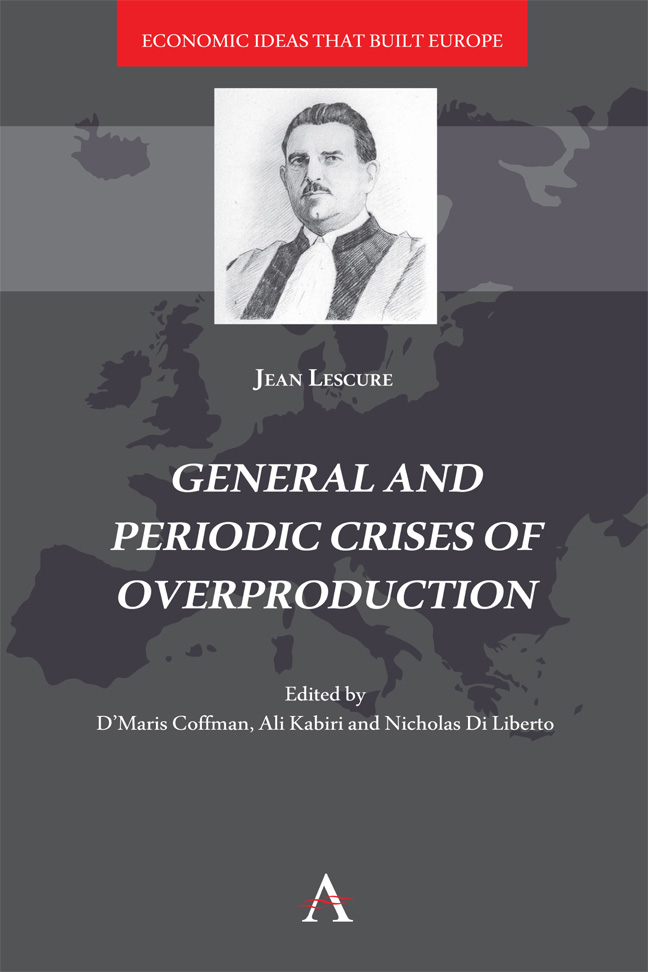Book contents
- Frontmatter
- Contents
- Acknowledgements
- Introduction: Jean Lescure on the Role of Solidarité in Industrial Economies and Among the Social Sciences
- Translator's Note
- General and Periodic Crises of Overproduction
- List of Figures
- List of Tables
- Preface to the Third Edition
- Preface to the Fourth Edition
- Preface to the Fifth Edition
- Volume One The Phenomenon
- Volume Two Causes and Remedies
- Conclusion
- Annexes
- Appendix One Bibliography of the Works Cited by Jean Lescure
- Appendix Two Bibliography of the Works of Jean Lescure
- Index
Conclusion
Published online by Cambridge University Press: 01 March 2024
- Frontmatter
- Contents
- Acknowledgements
- Introduction: Jean Lescure on the Role of Solidarité in Industrial Economies and Among the Social Sciences
- Translator's Note
- General and Periodic Crises of Overproduction
- List of Figures
- List of Tables
- Preface to the Third Edition
- Preface to the Fourth Edition
- Preface to the Fifth Edition
- Volume One The Phenomenon
- Volume Two Causes and Remedies
- Conclusion
- Annexes
- Appendix One Bibliography of the Works Cited by Jean Lescure
- Appendix Two Bibliography of the Works of Jean Lescure
- Index
Summary
Despite the profound disruptions that have shaken the economic world since the war, the 1920 crisis and the 1929 crisis have demonstrated the persistence of our phenomenon.
No doubt the driving industries have changed: with the crisis of 1929, the car industry takes its place alongside the electrical industries and the railways. However, these industries are far from having achieved their full potential. The era of electricity and combustion engines that began in the nineteenth century is not over. Aviation is only just beginning. Steam networks have yet to be transformed into electrical networks, countries have yet to be equipped with power lines, hydraulic power has yet to be used and new countries have yet to be equipped. Housing must be rebuilt and improved everywhere. Large quantities of capital will be required. Their creation and use will be accompanied by alternating periods of growth and depression. Observation of the metal and machine industries will continue to bear fruit, with oil and electricity now having a place comparable to that of coal.
This is why we can still see the very keen interest of the industrialist, the merchant, the financier, the capitalist, the worker and even the politician, the criminologist or the sociologist, in recognizing the approach of a general crisis. The crisis often means the ruin of the merchant, the industrialists and the financier and a reduction of the capitalist's income. It signals unemployment, poverty, or at least a reduction in wages for the worker. Even the politicians are caught up in this kind of economic cyclone. Sometimes public opinion will blame the government; public finances will always be shaken.
How do we predict the onset of a crisis?
Since the time, already long ago, when the French Ministère du travail conducted the first study of the economic indexes that enabled the observation of economic trends and the forecasting of crises, considerable progress has been made. In almost every major country there is now a large service specializing in the creation and publication of these indexes and in their use as a tool for forecasting crises.
From 1908, the Bulletin du Ministère du travail and the Bulletin de législation comparée du Ministère des finances began publishing a selection of monthly indexes.
- Type
- Chapter
- Information
- General and Periodic Crises of Overproduction , pp. 474 - 488Publisher: Anthem PressPrint publication year: 2023

